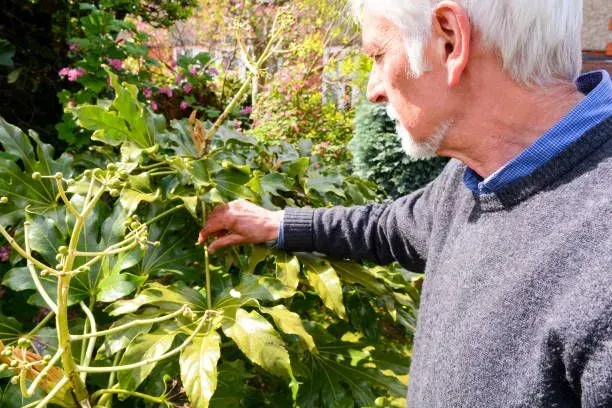Enhancing Dementia Care: Creating a Sensory Garden for Seniors
Enhancing Dementia Care:
Creating a Sensory Garden for Seniors
In navigating the complex landscape of dementia care, the importance of engaging a home care agency near you that specializes in this field cannot be overstated. Entrusting the well-being of a loved one with dementia to highly trained and experienced home health aides is essential for ensuring the highest quality of care and support. Dementia presents unique challenges that require a nuanced understanding, specialized skills, and a compassionate approach, all of which are hallmark qualities of caregivers who have received extensive training in dementia care. By partnering with a home care agency that prioritizes dementia care expertise, families can rest assured that their loved one will receive personalized, attentive care tailored to their individual needs, fostering comfort, dignity, and an enhanced quality of life.

Are You Searching for Highly Trained and Experienced
Home Health Aides and a Dementia Home Care Agency Near Me?
In dementia care, the need for being deliberate and thoughtful cannot be overstated. Every aspect of care, from daily activities to environmental design, must be carefully considered to ensure the well-being and safety of individuals with dementia. This population faces unique challenges that require a tailored approach, taking into account their cognitive abilities, preferences, and individual needs. By being deliberate and thoughtful in our approach to dementia care, we can create environments and experiences that promote dignity, independence, and quality of life for those living with this condition.
In the field of dementia care, innovative approaches continually emerge to enrich the lives of seniors facing cognitive challenges. One such approach gaining momentum is the creation of sensory gardens tailored specifically for seniors with dementia. At 7 Day Home Care, serving Manhattan, Queens, Brooklyn, and Long Island, New York, we recognize the profound benefits of sensory gardens in enhancing the well-being of our clients.
What is a Sensory Garden for Dementia?
A sensory garden designed for the elderly with dementia is a meticulously crafted oasis that engages all five senses to evoke memories, stimulate cognition, and promote emotional well-being. In such a garden, vibrant colors dance in the form of blooming flowers, soothing shades of greenery, and various textures of foliage that invite touch and exploration. Fragrant herbs like lavender, rosemary, and mint release their aromatic scents into the air, triggering reminiscences of past experiences and creating a calming atmosphere. The gentle rustle of leaves, the chirping of birds, and the trickling of water from a fountain or stream provide auditory stimulation, grounding individuals in the present moment and fostering a sense of tranquility.
Furthermore, a sensory garden offers tactile experiences through pathways lined with different materials such as smooth stones, soft grass, and rough bark, encouraging seniors to engage in gentle physical activities like walking or gardening. These pathways lead to secluded seating areas where seniors can bask in the warmth of the sun or seek shade under the canopy of trees, fostering moments of relaxation and contemplation. With each visit to the sensory garden, seniors with dementia embark on a sensory journey that awakens their connection to nature, sparks joy in their hearts, and nurtures their overall well-being.
Benefits of a Sensory Garden for Seniors
with Dementia and Home Health Aide Support Near You
- Stimulation of the Senses: Sensory gardens engage all five senses, providing a multisensory experience that can evoke positive emotions and memories. The vibrant colors of flowers, the rustling of leaves, the fragrance of herbs—all contribute to a stimulating sensory experience that can promote relaxation and cognitive function.
- Calming Effect: Nature has a remarkable ability to soothe and calm the mind. For seniors with dementia, who may experience agitation or restlessness, spending time in a sensory garden can promote a sense of tranquility and well-being. The gentle rustling of leaves, the warmth of the sun, and the rhythmic flow of water can all have a calming effect on individuals with dementia.
- Encouragement of Physical Activity: Engaging in gardening activities, such as planting, watering, and weeding, provides seniors with dementia opportunities for light physical activity and movement. This not only promotes physical health but also fosters a sense of purpose and accomplishment.
- Social Interaction: Sensory gardens create opportunities for social interaction and connection. Whether it's sharing stories about favorite plants or working together on gardening tasks, these gardens facilitate meaningful interactions among seniors, caregivers, and family members.
Creating a Sensory Garden with Highly Trained
and Experienced Home Health Aides
from the Best Home Care Agency Near You
Creating a sensory garden requires thoughtful planning and consideration of the specific needs and preferences of seniors with dementia. Here are some steps to help you get started, with the assistance of a home care agency's home health aides:
- Assessment and Planning: Begin by assessing the available outdoor space and identifying areas suitable for a sensory garden. Consider factors such as sunlight, accessibility, and safety. Work with a home care agency's home health aides who specialize in dementia care to develop a plan that meets the unique needs of seniors with cognitive challenges.
- Selection of Plants: Choose a diverse selection of plants that appeal to the senses. Opt for brightly colored flowers, fragrant herbs, and textured foliage. Avoid plants that may be toxic or pose a safety hazard.
- Design and Layout: Design the garden with accessibility in mind, ensuring that pathways are wide enough to accommodate wheelchairs and walkers. Create designated seating areas where seniors can rest and enjoy the garden. Incorporate features such as raised beds and vertical gardens to make gardening tasks easier for seniors with mobility issues.
- Engagement Activities: Plan activities that engage seniors in the care and maintenance of the garden. This could include planting flowers, watering plants, or harvesting herbs. Encourage sensory exploration by providing tools such as magnifying glasses or aromatic herbs for sensory stimulation.
- Safety and Supervision: Ensure that the garden is safe and secure for seniors with dementia. Install handrails along pathways, remove tripping hazards, and provide adequate supervision during gardening activities. Work closely with a home care agency's home health aides to ensure the safety and well-being of seniors while they enjoy the sensory garden.
Creating a sensory garden for seniors with dementia is a rewarding endeavor that can significantly enhance their quality of life. At 7 Day Home Care, we are committed to providing specialized dementia care that focuses on promoting independence, dignity, and overall well-being. At 7 Day Home Care, we understand the importance of personalized care for individuals with dementia, and we are dedicated to supporting families in creating nurturing environments that cater to their loved one's unique needs. By embracing the principles of sensory engagement and thoughtful design, we can cultivate spaces that foster connection, comfort, and joy for seniors living with dementia. Contact us today at 516-408-0034 or visit 7 Day Home Care, to learn more about how our specialized dementia care services near you can help your loved one thrive in the comfort of their own home in Manhattan, Queens, Brooklyn, Nassau County, and Suffolk County, New York.
Brian Callahan
7 Day Home Care










